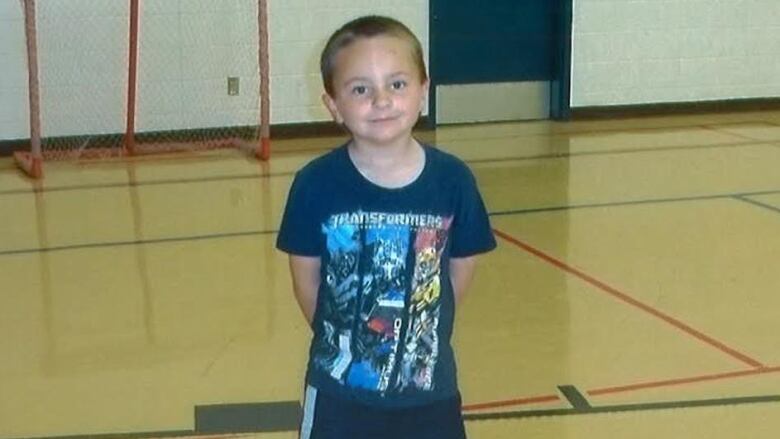Lee Bonneau inquest: Family services official in tears during testimony
Inquest into death of Lee Bonneau, 6, continues

An official who was the manager of child protection for the Yorkton Tribal Council's Child and Family Services agency broke down as she gave testimony Wednesday at the inquest looking into the death of Lee Bonneau, 6, who RCMP believe was killed by another boy, 10.
Lee was found badly beaten on the Kahkewistahaw First Nation in August 2013 after walking away from a bingo he had been at with his foster mother.
I didn't provide the oversight, that's what happened.- Betty Watson
Betty Watson, a manager at the time, still works with the tribal council's family services agency, under a different role.
Much of her testimony dealt with how the agency handled complaints and concerns involving the older boy, who is being referred to as L.T. at the inquest. Jurors had previously heard details about the troubled early life of the boy.
According to Watson 16 different employees of the agency dealt with files related to the boy and there were nine formal complaints concerning L.T. over four years. Yet only one person interviewed L.T.
Watson told the inquest that a 2008 complaint concerned allegations of neglect in L.T.'s home, suggesting the child's mother was drinking and not providing lunches for the boy. However, there was no response to the complaint and the investigation was eventually closed.
Another incident, in 2009, related to concerns that L.T. was exposing himself at school. Watson said there was no investigation or follow-up.
"I didn't provide the oversight, that's what happened," Watson told the inquest. She also noted that the agency gets over 200 reports per year and they are sometimes short on staff.
Watson was also asked about another complaint, in 2011, that L.T. was suspected of breaking into a home and killing a pregnant dog. She said the investigation on that was incomplete.
When asked if L.T. was a child in need of protection in 2011, Watson responded "Yes".
She then broke down and starting to cry.
"A tragedy has happened," she said. More officials from the Yorkton Tribal Council are expected to testify in the days ahead at the inquest.
FASD diagnosis in March 2013
The inquest also heard Wednesday from a pediatrician, Dr. Susan Petryk, who specializes in developmental challenges such as Fetal Alcohol Spectrum Disorder.

Petryk said she examined the boy in March2013 and discovered he had an undiagnosed and severe form of FASD, with brain impairment and intellectual disability.
She testified that a child with an FASD diagnosis has needs that are difficult for a family to provide, without assistance.
Consultants, she said, could help the parents, as well as the school.
"In medicine, we wouldn't give a diagnosis of stage four cancer, then send the patient home to find treatment alone," Petryk said. Her report was provided to L.T.'s parents, his school, a local doctor and a child psychiatrist.
Petryk said the FASD assessment should have led to more action adding she would like to see trained FASD consultants in the province to provide case management and supports for families.
Petryk was also asked to comment about the violent acts connected to L.T. and FASD.
"There's no connection with FASD that I'm aware of," she said. However she did note that one element of the disorder concerns controlling impulses. "Impulsive aggression can be seen [in FASD patients]."
She added a forensic psychiatrist would have better information about that topic.












_(720p).jpg)


 OFFICIAL HD MUSIC VIDEO.jpg)
.jpg)



























































































